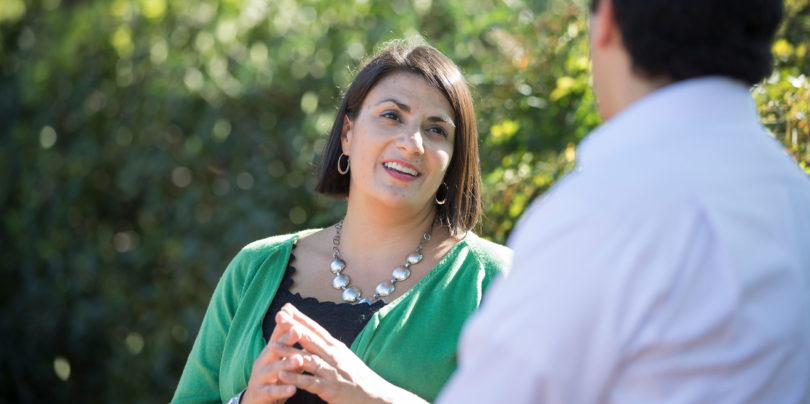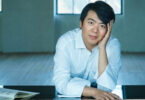Paola De Santo, an assistant professor of Italian in the department of Romance languages, combines the study of language and culture through innovative courses, study abroad and internship opportunities.
Where did you earn degrees and what are your current responsibilities at UGA?
I earned a Bachelor of Arts degree from the University of Michigan, a Master of Arts degree from Boston College and my Ph.D. from Harvard University, all in Italian studies.
I am an assistant professor of Italian in the department of Romance languages, part of the Franklin College of Arts and Sciences. I currently teach undergraduate and split-level (undergraduate/graduate) courses in Italian, mostly at the 3000 and 4000 level, but occasionally at the lower levels as well. I also have developed a study abroad program in collaboration with UGA’s residential center in Cortona, Italy; this program, called “UGA in Italiano,” affords students an immersion experience by living with local families in Cortona as well as intensively studying the language and culture of Italy. Another endeavor of which I am particularly proud and excited is an internship program I established in collaboration with a network of public schools in the province of Brescia, in northern Italy. Through this program, students act as English language assistants in schools across the area, perfect their Italian language skills and gain critical cultural competency by living with local Italian families—and even get compensated for this unique experience! This academic year, eight UGA undergraduate students studying Italian will participate in the program, and I cannot wait to hear about their experiences.
When did you come to UGA and what brought you here?
I arrived at UGA in fall 2014. I was thrilled to come to UGA since the Italian section of the Romance languages department was looking for a new faculty member whose expertise remarkably matched my own. Not only would I be able to teach upper-division courses in my area of specialization, early modern Italy, but also have the opportunity to develop innovative courses that combine the study of language and culture. Additionally, the enthusiasm in the department for the development of an immersion study abroad program in Italy was particularly attractive.
What are your favorite courses and why?
I always experience difficulty answering “favorite” questions … and though it may sound like an evasion, I am honest in stating that I enjoy all the courses I teach for different reasons. As an early modern specialist, teaching ITAL 4060/6060, a survey course on the literature and culture of Italy from 1400-1700, is a challenging privilege. Firstly, just choosing the course material, which spans the first stirrings of the Renaissance through the late Baroque, is daunting as well as exciting. The course is taught exclusively in Italian and it challenges me as a scholar, but also as an effective language instructor since students are asked to read, for example, Machiavelli’s “Prince” in the original 16th-century Italian, as well as analyze and discuss it in Italian as well. My goal is that neither content nor language acquisition eclipses the other. I also enjoy this course so much since I witness students begin to appreciate how much we can learn about our own contemporary culture from this material.
I also really enjoy teaching the third and fourth year “conversation and composition” courses (ITAL 3010 and 4010), whose structure allow me the freedom to design thematic courses to encourage advanced expression while learning about fascinating aspects of contemporary Italian literature and culture, such as the hugely popular the “giallo” (mystery novel) and its derivatives, as well as the correlation between food and knowledge in all aspects of Italian cultural production.
And, I also adore teaching elementary Italian language courses. The enthusiasm beginning students have for Italy and its language is reinvigorating, as is the exponential growth in language competency that is characteristic of this level.
What are some highlights of your career at UGA?
I am quite honored to have been selected as a Willson Center Faculty Fellow and the winner of the Virginia Mary Macagnoni Prize for Innovative Research for the 2017-18 academic year. This generous fellowship and humbling award will allow me to complete revisions to my book manuscript and progress toward tenure. Being selected as a Lilly Teaching Fellow for 2016-18 academic year is also certainly a highlight, since I have been able to make connections with a diverse group of faculty members from across UGA, with all of whom I share a commitment to teaching excellence and constant improvement.
How do you describe the scope and impact of your research or scholarship to people outside of your field?
In my research, within the early modern Italian context, I focus on transitional, and often marginal, social actors and their cultural production to understand how historical, political and cultural forces inform their work in order to better situate them in a rapidly changing period. For example, in my book, provisionally entitled “(Ne) Habeas corpus: Bodies Natural and Politic of the Ambassador and Courtesan in Renaissance Italy,” I look at these two public figures and their writings and argue that the place of their bodies in relation to the metaphor of the body politic demonstrates a transition toward modernity. In another project, a critical translation of the actress and writer Isabella Andreini’s letters (1607) in which she uniquely alternates between the male and female voice, I seek to better understand how the performance of gender, on the stage and the page, both affirm and reject traditional roles of men and women.
How does your research or scholarship inspire your teaching, and vice versa?
I am committed to interdisciplinarity in both my teaching and research, which is particularly essential when approaching, for instance, the Renaissance in Italy when concurrent dialogues among literature, music, visual arts, politics, etc. were paramount. For instance, in my courses I often engage with the visual arts in addition to literary texts to enhance and challenge our understanding a given work.
What do you hope students gain from their classroom experience with you?
I hope students gain increased interest in the subject matter, are more confident in their Italian language skills and are driven to explore Italy and its culture long after the semester ends.
Describe your ideal student.
I appreciate students who are genuinely enthusiastic and curious about learning for its own sake, who take the privilege of their time in college to question and seek, who strive to grow intellectually and emotionally, and consciously resist the pressure to strive only for great grades and a high-paying job.
Favorite place to be/thing to do on campus is…
… Gilbert Hall, since here I get the chance to exchange words with my wonderful and inspiring colleagues and students. I also love to walk through the Founders Memorial Garden; it is such a restorative distraction from the daily hustle.
Beyond the UGA campus, I like to…
… cook, spend time with family and friends, travel and hang out with our dog.
Community/civic involvement includes….
… being a member of Athens for Everyone and, when we can, fostering homeless dogs waiting for their forever homes.
Favorite book/movie (and why)?
With the risk of seeming like an obvious choice for a scholar of Italian literature and culture, I still consider Dante’s “Divine Comedy” to be a most influential work in both my formation as a scholar and reader. There are few works that are so “of their time” and completely relevant as the “Comedy.” Of contemporary texts, I am a great admirer of Elena Ferrante’s work and am currently making my way through her quartet of “Neapolitan Novels.”
The one UGA experience I will always remember will be…
… my campus visit to UGA that almost did not happen! I was scheduled to come to campus on the day of the infamous “snowpacalypse” of 2014, which left me and thousands of others stranded at the Atlanta airport. Thanks to the extraordinary generosity of my (now) colleague, Tom Peterson, who dared to make the trip that the Groome shuttle would not make, I was able to make it to campus, complete my interviews and eventually be selected for the position I now hold.
(Originally published Oct. 29, 2017)







